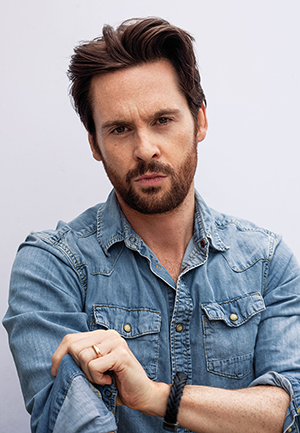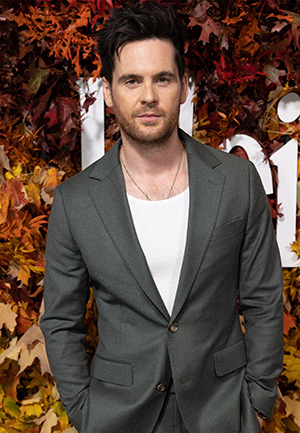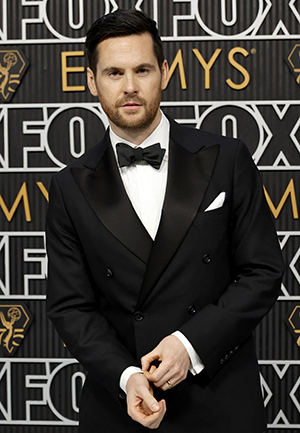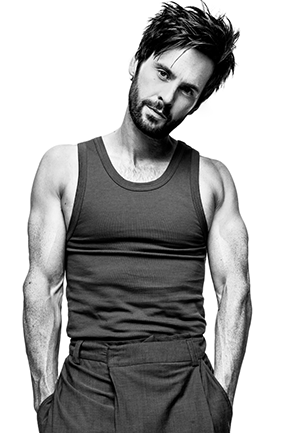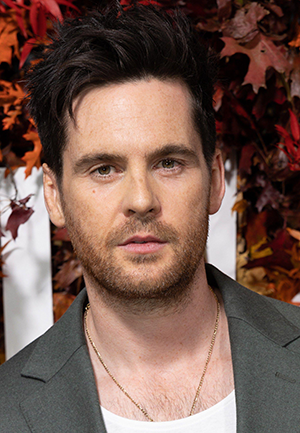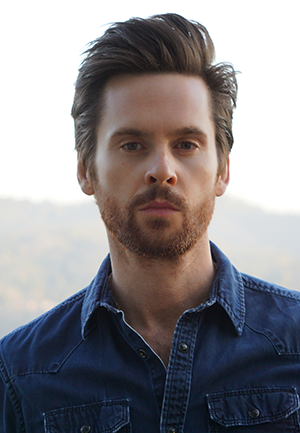In an interesting new interview for Comic Book Resources, Tom gives us more insight into his role as one of the co-producers for Da Vinci's Demons season 2. Read the full interview on the site.
Spinoff Online: After having done one season of Da Vinci’s Demons, do you feel like the character is completely in your wheelhouse, or is it still sort of an ongoing process of discovery?
Tom Riley: It’s always an ongoing process of discovery. I think the minute you stop trying to improve that is the minute you’re lost. The stuff I found out about Leonardo for that first season was so far away from anything I had in my head of who he was that I had to kind of slightly reconsider how to approach it. Because on the page he was really arrogant and cocky, and then everything I read about him is he’s arrogant and cocky – but no one thinks that about him. Everyone thinks he’s this incredibly wise old man and always was. Always was a wise old man. So I kind of have enjoyed the taking that sort of cocky arrogance and beginning to either make him a little humility or make him realize that behaving the way he’s behaving isn’t working out for him in perhaps the best way and it’s affecting himself as much as it’s affecting the people around him. So you definitely watch what’s come before and try and improve. And hopefully next season three I’ll back and do the same thing again.
Are you finding that the writers are starting to create character details and things based on your interpretation of the character, or do you feel like you’re still applying sort of yourself to their interpretation?
I think when a show works best it’s when everyone’s holding each other’s hand. You’re all pushing in the same direction and I think there are moments that they go, we like that from Season 1; we’re going to put more of that in – for all of us, for all the characters. And sometimes it’s we’ve seen him do this, let’s try something else. So I just think it’s a really interesting mix the second season.
As an ongoing challenge, what do you have to pay attention to most? Is it just the script, or do you have to look at the historical context of this since there is so much reinvention?
Certainly in the first season I tried to find everything about the historical period. I tried to learn all about the patterns and conspiracy and all the various different things that weave in and out of the fiction and the fancy. And the second season we’re gifted with this period in his life from 27 to 32, where literally no one knows where he was. He drops off the map. There’s no records. So I didn’t quite have to research so hard this time with the Incan Empire because it doesn’t exist. It’s David’s idea of what if it does? So that stuff kind of freed us up to play a bit more fast and loose with historical truth.
How then do you find something that you feel like is not only dramatically compelling but authentic to what we do know of him?
To be honest, the hardest challenge, the biggest balance, the tightrope is making the biggest genius that has ever been recorded in human history also vaguely relatable. That people in the audience will go I kind of identify with him. I feel bad for that. And that’s hard because when a guy is constantly solving everything like that and seems capable of doing anything it’s tough to like. So that has been the stuff that I’ve tried to – that’s been my way in, the human aspects of him. That difficult relationship with a parent, all that sort of stuff. The powerlessness, the pursuit of affection, all that stuff that people would get, where as they can’t necessarily understand the engineering or the pulling of trigonometry out of the air and having it dance across my face on the screen.
When you read a phrase like, “He unlocks a part of his mind that has information he didn’t know he had,” how do you create something that you can relate to as an actor?
That’s tough. So you latch onto the emotional side of it. How is this making him feel, and then I’ll let the effects and the script to do the rest. Because otherwise if you try and tell the story too hard, forget being the person, that’s when you get caught. You need to leave that to other people. And I go, is that going to come across? Is that going to work? And then you just need to go, it doesn’t matter, just let it. Do your thing and hope that it does.
With so much history to sort of contextualize all of the show’s storytelling, how tough is it for you to keep straight just narratively throughout the season?
Well, for me I was lucky I’m producer on the second season, so I was lucky enough to see scripts from the beginning and see them right through and follow it the whole way from start to middle to end to conception to the edit, so I feel like I know it this year. The first season, yeah, I did seem to think, “Oh, hold on, who’s that character then?” There’s so many of them, which isn’t good because the actor will go, “I’ve been here for six weeks.” It’s hard but I think because the season’s more serialized, it allows audiences more of a chance to invest and therefore get to know people better.
How eager are you, either as a producer or an actor, to sort of fold in the actual events, things of his life into this, particularly without it becoming like a Mr. Peabody & Sherman series of vignettes?
Honestly, it doesn’t matter to me. I think we’ve set up the historical background. We made it very clear that it’s a historical fantasy and the plot has got to be driven by character ultimately. And we’ve set up these characters and they got to go where they go. And if you start trying to go well wouldn’t this be cool, that’s when you start getting caught out. So I’m always about letting the characters drive the story. And yes you’ve got to not just pay lip service but you’ve got to have genuine historical moments happen.
So while he’s in the Incan Empire, he’s not going to throw together the Mona Lisa or something like that?
Oh, you’d be surprised. I wouldn’t want to give too much away but you’ll be surprised.
I know the producers have talked about the fact that they don’t want to misrepresent Da Vinci’s sexuality or to leave it off the table. How much of this new season explores any of that, and how important is it ultimately do you feel like to the storytelling?
To storytelling, I don’t know. But as far as to representing him I think it’s a really key part of who he is that and I push for it. And certainly in the second season you’re going to see his eyes flicking to men just as much is they do to women. But for us, what we were trying to do with the season, and I stick by this in Season 1, is that one person that we hold dear to how they wrote and what they said is Leonardo himself. And he actively refused to the define himself. Lots of people have done it for him since on both sides of the argument and have been very militant about it on both sides, and that’s just who he was. He was definitely heterosexual. He was definitely homosexual. He was definitely bisexual. And actually, we said, well what did Leonardo say? For whatever reason he refused to define himself; he refused to. So we kind of thought well what does that say? Why would a man do that? That’s interesting. And we came to the sort of thing that he was bisexual but he just didn’t think it should matter. And he was fascinated by the human body be it female or male. He was borderline austistic. So it wasn’t perhaps completely as emotionally engaged people as he could be. And so we just thought we would play with that idea. And I hope to continue playing with that idea in this season and future seasons.
Maybe further along those lines, or in general, how careful do you have to be about not being too forward-thinking? Of thinking, “these people are crazily outdated,” or in updating it to appeal to a modern audience without it violating the values of the time, say in terms of something like women’s place in society?
Well, of course that’s the other thing about the sexuality side of things is that that really the only weapon the women had of power was how they could seduce a man. You know Lucrezia certainly uses her body because she doesn’t have anything else, apart from her mind, that will actually get her vaguely into those worlds of authority that she just wouldn’t be allowed to part into because of her sex. So that’s stuff’s important. As far as we dealt with thinking ahead of our time and the show has always been vaguely anachronistic, not at least with the Season 1 haircut and the leather jacket. And that was always an intention. And David wanted Leonardo to speak with a very contemporary, throwaway style because he wanted him to seem like a man out of time. Like a man who was 400 years in the future who had somehow plopped in there and could just see things that other people couldn’t because he is in a period drama going, “Why are you all being so stiff?” Some of that worked, some of that didn’t. I’d say in the first season we tried to sort of meld it back to something more cohesive by the second. So we’re always aware of it. It’s just really about making the show have its own voice.
How do you divide your responsibilities as a star and producer? Or where do you sort of leave one behind?
I leave one when I’m on set doing the scenes, and then in pretty much every other waking moment, I just worry about the show.
What are those responsibilities?
Oh, it’s been a really nice in post [production] because I kind of see it as a personal arena to sort of keep fighting for the character moments. Because invariably once you get to the stage where the effects just takes over and sound and grading is they’re very specialized sections and they end up I want to make this like this and look like that and you can lose bits in the melee afterwards. You can lose the tiniest little nuance moments. And I’ve just tried to make sure that people think about what they’re excising. I’m like maybe it could mean this, maybe it will link to that later and an episode could be worth keeping? I haven’t won all the battles, and it’s a minor role, but I’ve enjoyed being able to play in that playground for the first time.
In these different descriptions of the character I’ve seen, they use terms, or phrases, like the chosen one. How much does that hero’s myth stuff really apply in terms of the storytelling, particularly because you have this stretched over so many potential seasons?
Well, for the man, for Leonardo, a hero’s myth, I don’t know in the real Leonardo. But as far as our story’s concerned, he’s an adventurer. We’ve sent him off on a quest and he’s, for whatever reason, he is on a quest. And I’ve always felt like The Book of Leaves is always a symbolic thing as much as it holds all the knowledge in the world, and for him that is something incredibly seductive. But also it’s a symbol of the most impossible puzzle. And for a man who can look at how anything is built and instantly dissected in his mind, that is a triviality where as this is something that’s really driving him. The desire to prove that there’s a scientific rational reason for that. That is his quest, his heroic quest, as it were. And on the way he’s going to have a tragic fall and going to dare to all those Greek, as I say clichés, Greek rules. Greek conventions. And I think it’s important to the story, yes. Important to the real man? No one’s life ever really goes in a perfect heroic tragic arc.
Is this a different kind of discipline for you as an actor? Have you ever really dealt with something like this where you had this much time with the one character to continually refine and evolve him?
No. I’ve never done that. That’s a real treat, to sort of gradually just build and build someone and just reveal various facets. It was like peeling away layers of an onion; it’s nice. You don’t really get that anywhere except TV. I think that’s why TV’s enjoying this golden age because people like to watch people grow, just as much actors like to make their characters grow. You like to feel like hey, Jesse wasn’t like this in Season 1. Paul was a teacher, now look. It’s fun. I love that stuff.
With an entire season for the world to react to, how soon do you anticipate people are going to really be excited or surprised by what happens?
I think mid-season people are going to go bonkers. I think by the middle of the season, around episode five and six, we throw our toys out of the pram. And it will go one way or the other, and I can’t wait to see how it’s reacted to.
Will something like whatever this moment is, even if it’s well-reacted to, send the entire series into a different direction?
No, I don’t think so. I think it’s always dangerous to listen too strongly to what fandom, for want of a better word is saying. Because then you’re in danger of being self-indulgent and going, hey, I’ll do a little like tip of the hat to the fans where they sort of do that. And actually what I really want as a fan is to constantly be like, oh, I didn’t know I wanted that and now they’re give me that now as well. And it’s hard. It’s easy as writers, producers, directors, actors to go this works, let’s keep doing it. It’s harder to keep pushing the envelope – no one thought when we were doing our Florentine first season that we’d be in the new world with the Incan Empire.
